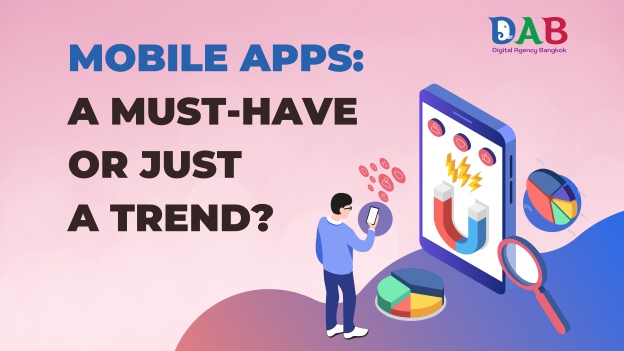Mobile Apps: A Must-Have or Just a Trend?

In the fast-paced digital world we live in today, mobile apps have become deeply embedded in our daily routines. From ordering food and booking flights to managing finances and chatting with friends, there's an app for almost everything. But as the app stores become more crowded and user attention more fragmented, a pressing question emerges: Are mobile apps truly essential for businesses and individuals, or are they just another fleeting tech trend?
The Rise of the Mobile App
Over 90% of internet users in Thailand access the web via mobile devices, making smartphones the primary tool for Thais to connect to the digital world. Since the launch of the App Store in 2008, the mobile app ecosystem in Thailand has grown rapidly and become deeply integrated into everyday life.

Why Mobile Apps Feel Like a Must-Have
1. User Convenience
Apps are often faster, more intuitive, and tailored than mobile websites. A well-designed app provides a seamless experience, especially when accessing content offline or using device-specific features like GPS, camera, or push notifications.

2. Brand Loyalty & Engagement
Businesses use apps to create direct communication channels with customers. Loyalty programs, personalized content, and push notifications keep users engaged, increasing the chance of repeat usage or purchases.

3. Data-Driven Insights
Apps allow companies to collect valuable user data about what features are used most, how often users log in, where they drop off. This data helps refine offerings and improve customer satisfaction.

4. Offline Access
Many apps provide at least limited functionality without an internet connection, something that websites can't easily do.

The Counterpoint: Are Apps Always Necessary?
Despite their advantages, not every business or user needs an app. Here's why:
1. Saturation & App Fatigue
The average user only actively uses about 9 apps per day, despite having dozens installed. Unless your app provides unique value, it risks being downloaded and forgotten.

2. Development Costs
Building and maintaining an app can be costly especially if it needs to run on both iOS and Android, or integrate with legacy systems.

3. Web Apps Are Catching Up
Progressive Web Apps (PWAs) have improved significantly, offering near-native experiences without the need to download anything. They're often more accessible, especially for smaller businesses.

4. Privacy Concerns
Users are becoming increasingly cautious about data privacy. Many apps request permissions beyond what’s necessary, creating trust issues.

When You Should (and Shouldn’t) Build an App
Build an App If:
- Your product needs to leverage smartphone hardware (e.g., camera, GPS).
- You aim for high user engagement or want to send push notifications.
- Your users will return frequently, and you want to create a sticky experience.

Consider Alternatives If:
- Your website can offer the same functionality.
- You have limited resources for app maintenance and support.
- Your audience is not particularly mobile-first.

Conclusion
So, are mobile apps a must-have or just a trend? The answer is: it depends. For some businesses, mobile apps are a game-changer, a direct line to customer loyalty and digital growth. For others, especially those with limited resources or simple offerings, an app might not offer enough ROI to justify the investment.
Rather than chasing trends, businesses should evaluate their audience, goals, and capabilities. If a mobile app aligns with your strategy and offers true value, go for it. If not, don’t be afraid to invest in a responsive website or PWA instead.
Because in the end, it’s not about having an app, it's about solving a real problem for your users.


